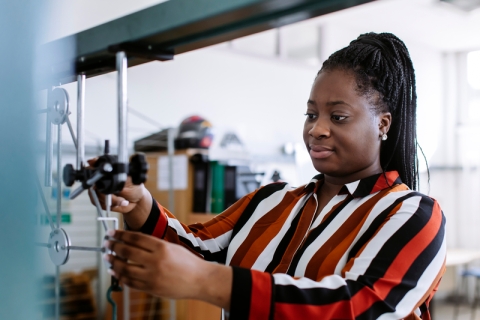

Civil Engineering graduate Mimi discusses her role as an Assistant Materials Engineer and the impact her time at University had on securing her perfect job
4 min read
British Science Week is a national event that provides a platform for educators, professionals, communicators and the public to recognise and celebrate the work being undertaken in STEM related fields (Science, Technology, Engineering, Maths). This year’s theme is ‘Innovating for the Future’ and, with so many Portsmouth graduates working in STEM, we want to showcase the important work they’re doing and how they are innovating for the future in their roles.
Mimi Nwosu is a 2018 BEng (Hons) Civil Engineering graduate who works for Align JV (Sir Robert Mcalpine) as an Assistant Materials Engineer. We asked Mimi to tell us about her role, her journey since graduating and what advice she has for students and graduates thinking of working in STEM:
How did you get into STEM?
I got into STEM through a chance encounter. I was invited to a civil engineering lecture whilst studying for another degree! After 15 minutes of conversation with the lecturer and little research (I like to take risks), I decided to transfer to the University of Portsmouth and study civil engineering. I was worried as I didn’t have the prerequisite A-level subjects but I was determined to achieve the best results and challenge myself. I appreciate the University’s faith in me.
I’m innovating for the future by helping to review ways to use less cement and replace it with other cementitious materials such as ground granulated blast furnace slag in our concrete mixes. Concrete is a fantastic material and is well known for its impressive characteristic properties such as its incredible compressive strength (able to support large loads). However, it is not so popular environmentally, the production of cement (one of the materials used to make concrete) contributes towards 8% of the global C02 emissions. As concrete is the most used human-made construction material in the world, it is great to be part of these innovations!
Mimi Nwosu, BEng (Hons) Civil Engineering (2018), Assistant Materials Engineer, Align JV
How did you find your placement?
I decided to cover all the modules including geotechnical, structural, environmental engineering and construction management. I was so inspired during my time at Portsmouth and in particular by Dr Lee Woods who always offered me sound advice and encouraged me to explore opportunities available to me. This led me to undertake a placement year where I worked as an Undergraduate Engineer for a global constructions management firm in London. My role included design management and I worked in a multidisciplinary team of 50 and over 100 subcontractors.
I returned back to Portsmouth with a wealth of experience and knowledge and felt more than prepared to finish my degree. I achieved a first-class for my dissertation and I fell in love with concrete technology and its complexities.
My favourite module at University was soils and materials. I have always been interested in sustainable development and wanted to design and build for a better future – I knew material science would pioneer this! It was at this point that I knew I wanted to become a Concrete Engineer.
Mimi Nwosu, BEng (Hons) Civil Engineering (2018)
What did your role involve?
In my role as Assistant Materials Engineer, I specialise in concrete quality productions and I’m currently working on a project called HS2, C1 which is one section of the new high-speed rail line from London to Birmingham. This involves:
- Helping to review concrete specifications, ensuring they meet specifications requirements and British standards
- Working with our concrete supplier to conduct concrete optimisation and mix development trials
- Managing the materials testing laboratory on-site, ensuring all the tests required are completed and analysed
- Witnessing concrete pours and ensuring health and safety procedures are being adhered to
- Following all quality assurance procedures in relation to concrete production
- Reviewing the concrete mixes for all the concrete used on site for all the different elements of the project
Where next?
The engineering and construction industry is so varied and I haven't stopped learning. The advancements in modern technology have really changed the industry and I am excited to see where my career and the industry will go. The construction industry is really fast-paced, and I love the number of people I meet on a daily basis, whether that's knowledge sharing, solving problems or sharing a joke, everyone has made me feel comfortable.

What would be your advice?
My advice for students and graduates looking to get into STEM is:
- Set goals but don’t be too hard on yourself
- Gain experience within your field (placements, internships, work experience)
- Attend external conferences and lectures on topics that interest you
- Know your industry (including current affairs, new technology)
- Expand your network (LinkedIn, networking events)
- Grasp all opportunities available to you, and create your own. A wise person once said to me “if you don’t ask, you don’t get”
- Keep your CV and cover letter updated (all experiences are valid)
- It is OK to fail; failure could be the start of a new adventure
- Be bold, be brave!
How did studying at the University of Portsmouth benefit you?
I’ve got such fond memories of my time at Portsmouth and am so grateful to the School of Civil Engineering and Surveying (SCES). The lecturers are so passionate about their respective subjects which really transcends in their teaching. Everything I covered during my studies was relevant to the industry and I can honestly say that I’m seeing this regularly in the workplace. I also got to meet truly inspiring industry professionals and I love that they also studied at SCES!
